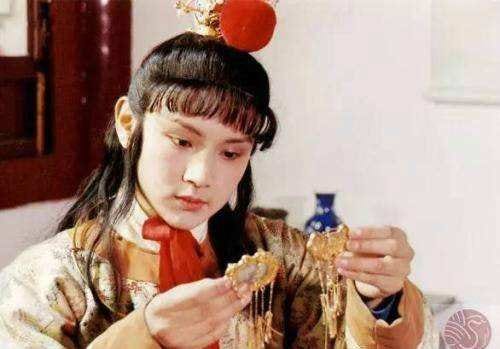How The Couplets Match
The story behind Dream of the Red Chamber is normally presented as a melodramatic love story between Jia Baoyu and Lin Daiyu. There is usually a focus on the fact that the characters shared a love that society simply would not allow. In that sense, the novel is indeed close to Romeo and Juliet.
But what most people forget is that there’s another side to the story. In fact, you could easily interpret this part of the book to indicate that Jia Baoyu was actually fated to be together with Xue Baochai, and that Lin Daiyu might be a third wheel trying to crash the party.
The inscriptions on the two amulets match up nicely, though they are not actually a poem. Here’s what they look like together:
莫失莫忘
不離不棄
仙壽恆昌
芳齡永繼
Never lose, never forget
Never leave, never abandon
Eternal life, lasting prosperity
Youth forever preserved
All four lines provide the exact same grammatical structure, and the lines parallel each other in meaning directly.
So how can this be? Why would the lines of these amulets line up so perfectly?
Here are a few lines of interpretation that come directly to my mind:
Jia Baoyu And Xue Baochai Are Destined To Be Together
This is the most obvious reading. In this interpretation, Xue Baochai was actually the 絳珠仙草 (the crimson fairy plant) in the first chapter of the book. She’s the one who followed Jia Baoyu to the earth, and the crazy monk gave her the necklace because she’s the one who is supposed to be with Jia Baoyu.
The problem with this interpretation, of course, is that the mythical plant promised to repay the stone (Jia Baoyu) through her tears. And Xue Baochai just doesn’t cry all that much. It’s Lin Daiyu who cries all the time.
However, when you know how the story ends, there is still an argument to be made that the sorrow that Xue Baochai feels about her fate could be interpreted as the tears that repay the debt.
Xue Baochai Is An Imposter
This is a political argument, which makes it even more interesting.
As I’ve noted before, the true power in the Jia family lies in the hands of Wang Xifeng. And, of course, Wang Xifeng is not a blood relative of the Jia family. She’s only part of the family because of her marriage to Jia Lian, which is a marriage that is falling apart.
Because Jia Baoyu is Lady Wang’s son, it’s extremely likely that she knows precisely what is inscribed on the jade. She gave birth to him, after all. If the story of him holding the jade in his mouth is true, there is a chance that Lady Wang might have taken advantage of this truth to figure out a way to have her niece (Xue Baochai’s mother is Lady Wang’s sister) become the perfect match with Jia Baoyu.
The evidence here is that Ying’er, Xue Baochai’s maid, blurted out the similarities between the inscriptions on the necklace and those on the jade. Xue Baochai’s modest refusal to admit that there was a connection could be interpreted as frustration on her part and worry that the plan was revealed too soon.
In this interpretation, the true heavenly origin story has Lin Daiyu as the true 絳珠仙草 (crimson fairy plant), and Xue Baochai is an awful character who has come in the way of true love.
The problem here, of course, is that there’s really no reason to doubt Xue Baochai’s sincerity. In fact, the female character most likely to come up with a lie to promote her own interests is Lin Daiyu, not Xue Baochai.
There Is No Divine Origin Story
The third angle I can see is that the whole thing is a bunch of silliness.
The monks do exist, of course, but they don’t seem to be playing any sort of helpful role at any part of the story. In fact, their actions only seem to confuse things and make people miserable.
Under this interpretation, Jia Baoyu received the jade as some sort of gift when he was extremely young. Rather than being an actual heavenly amulet, the jade is entirely symbolic, representing the hopes that Jia Baoyu’s family have for him and his development. The jade then becomes a symbol of the immense pressure placed on Jia Baoyu’s shoulders, and is actually a burden that he would like to relieve himself of.
Xue Baochai’s necklace might be part of some deep plot, or it might just be a common amulet that some crazy monk happened to give her. After all, the fact that the inscriptions match do not necessarily imply some sort of divine foreordination. In fact, the phrases inscribed on both amulets aren’t really anything out of the ordinary, and are fairly commonplace.
Wealthy people frequently look for a mystical origin story to excuse their wealth and power. Perhaps the desire to keep the good times rolling has inspired the Jia family to create a little bit of magic for their favorite prodigal son.
Of course, the problem with this interpretation is that there are constant references in the book to the divine origins spelled out in the first chapter. But it’s not an invalid reading.
There are certainly other interpretations that I’m missing. What do you think?



